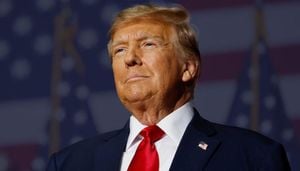Donald Trump’s decisive victory in the US presidential election has reignited discussions around US-Middle East relations, especially considering the persistent tensions arising from the enduring Israel-Gaza conflict. This situation remains unresolved more than a year after it reignited with renewed fervor.
Upon assumption of his second term, Trump’s reiteration of the “America First” policy is likely to have significant repercussions for Middle Eastern geopolitics. His previous administration’s approach provides some insight on his future actions, especially concerning long-standing Middle Eastern conflicts.
How Trump Views the Israel-Palestine Conflict
Known for his strong support for Israel, Trump has frequently referred to himself as Israel’s greatest ally. During his first presidency, he made pivotal moves such as relocating the US embassy from Tel Aviv to Jerusalem and officially recognizing Israel’s claims over the disputed Golan Heights region.
A highlight of Trump’s diplomatic legacy is his role as the architect of the Abraham Accords, which established formal relations between Israel and several Arab states, including the UAE and Bahrain. This was transformative, as it marked a shift from decades of Arab states not recognizing Israel since its establishment in 1948.
Despite these advances, the recent Israel-Hamas conflict has cast uncertainty on future agreements. An anticipated normalization agreement between Israel and Saudi Arabia was under discussion before hostilities escalated, but the current atmosphere poses challenges to such diplomatic efforts. Saudi Arabia, facing backlash over its ties with Israel during wartime, hasn't engaged openly with the Israeli government.
Continuing with his critique, Trump has characterized the conflict as indicative of failures under President Joe Biden and Vice President Kamala Harris. He chastises their leadership by stating, "This attack would not have happened if I were president," reflecting his belief he would have maintained stability.
Trump’s campaign messages frequently pivot back to denouncing the war and pushing for peace. He has made statements urging both for the rapid conclusion of the conflict and for Israel to assertively pursue military objectives, emphasizing his long-held view of minimizing US involvement in protracted overseas wars.
While promising support for Israeli military efforts, his urging for speed suggests he recognizes the US electorate’s appetite for avoiding prolonged engagements overseas. This sentiment resonates particularly with Arab-American voters, some of whom shifted away from their traditional Democratic support due to the current conflict.
Trump's Approach to Iran
Throughout his first term, Trump’s foreign policy was heavily defined by his opposition to Iran, underlining his concept of “maximum pressure.” He famously abandoned the 2015 Joint Comprehensive Plan of Action (JCPOA), which had aimed to restrict Iran's nuclear capabilities, deeming it as "the worst deal ever.” This withdrawal resulted in severe economic sanctions against Iran, isolatising it politically and economically.
During his recent campaign, Trump has maintained his adversarial stance, asserting, "THIS WAR WAS TOTALLY PREVENTABLE. IT SHOULD HAVE NEVER HAPPENED. IF I WERE PRESIDENT, IT WOULD NOT HAVE HAPPENED!” Such declarations signal his commitment to re-establishing his previous framework against Iran, blaming them for destabilizing actions within the region.
Significantly, Trump's administration was marked by military actions against Iranian figures, including the assassination of General Qassem Soleimani, the head of the Quds Force of the Iranian Revolutionary Guards. Even today, Trump’s circle maintains hostility toward Iran, with plans for harsh economic sanctions to fold along with increased military support for Israel.
A former Trump official outlined the strategy, emphasizing, “Tightening the economic noose around Iran is going to be a day one foreign policy priority,” showcasing potential continuity from his first term.
Challenges Within Trump's Own Team
Despite Trump's proactive agenda, he faces internal challenges as he seeks to fill his administration with loyalists who adhere to the “America First” philosophy. Torn between the demands of foreign policy experts who favor traditional figures and his desire for unwavering supporters, Trump navigates these tensions as he builds his team.
This jockeying for influence is reflected through various appointments where establishment figures may impede Trump’s objectives. For example, Trump's decision to appoint Elise Stefanik as ambassador to the United Nations signals both compromise and the potential dilution of his policies, as establishment interests vie for control behind the scenes.
Observers will undoubtedly watch each of Trump’s appointments, as the dynamics could lead to internal divisions. Establishment forces could undermine his policies, restrict legislative progress, and even work to discredit Trump’s chosen officials, creating what many would call a “third phase” of resistance against the “America First” agenda.
The Global Ripple Effects
The convoluted interactions within American politics will undoubtedly echo around the globe. Nations are carefully monitoring the developments, knowing full well they might expect changes to their relationships and trade with America based upon how Trump’s policies evolve.
Should Trump realize the full potential of his “America First” vision, it could fundamentally shift global alliances and redefine US foreign policy objectives. For traditional allies, accustomed to cooperative engagements, adapting to Trump's unique approach may prove necessary, whereas adversaries may find themselves recalibrated against new, assertive policies alien to their interests.
For Trump's supporters, this politically charged environment emphasizes their frustrations—the intricacies of political maneuvering often remain obscured from sight, making it hard to take effective action within his administration. The stakes extend beyond Washington, shaping the US’s identity and its engagements globally.
The upcoming months stand pivotal, having the potential not just to outline the future of US policy but also to influence the broader contours of international relations. The developing situation, reflective of historical tensions, may continue to amplify the significance of US-Middle East relations under Trump's leadership.



